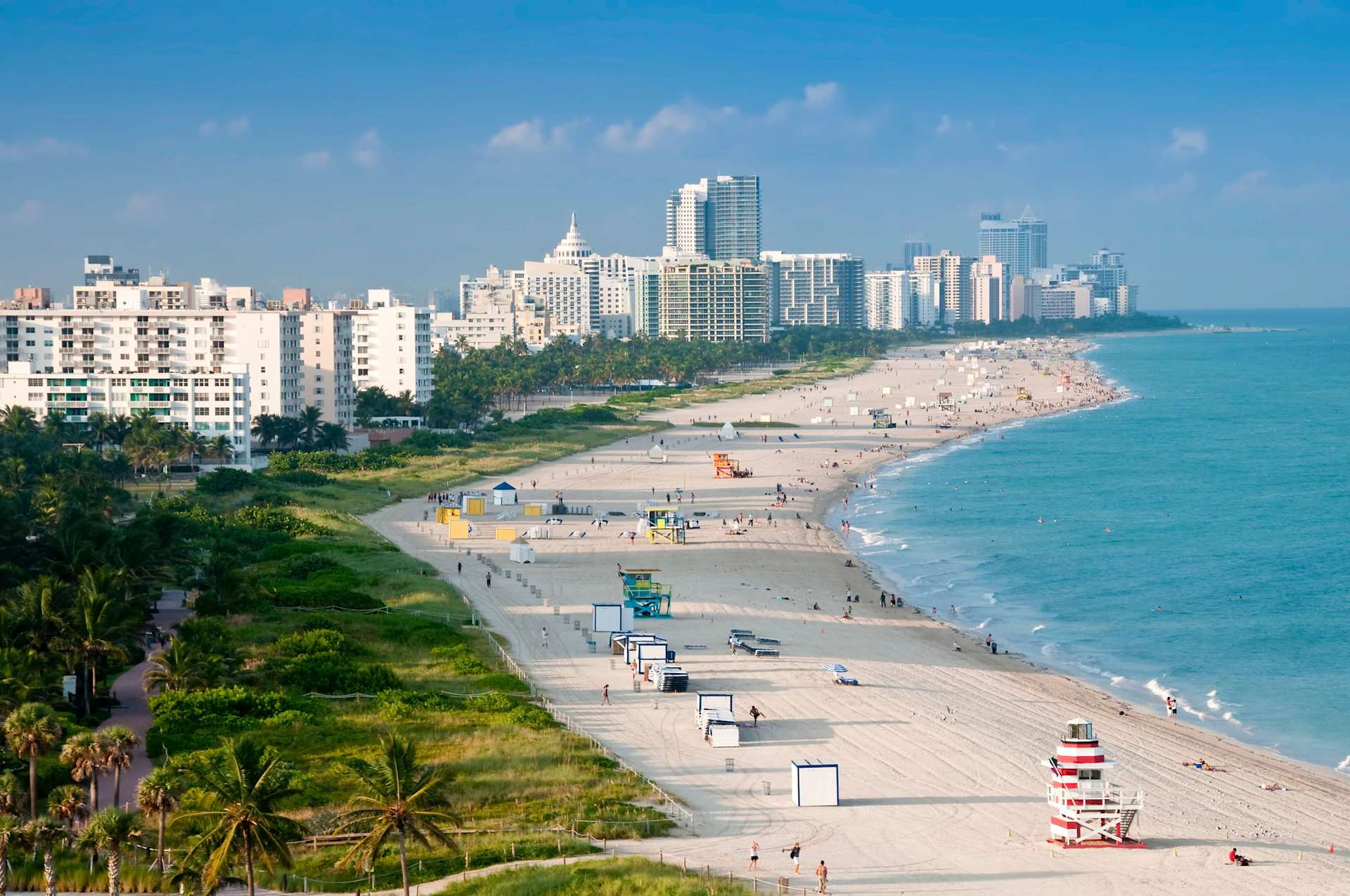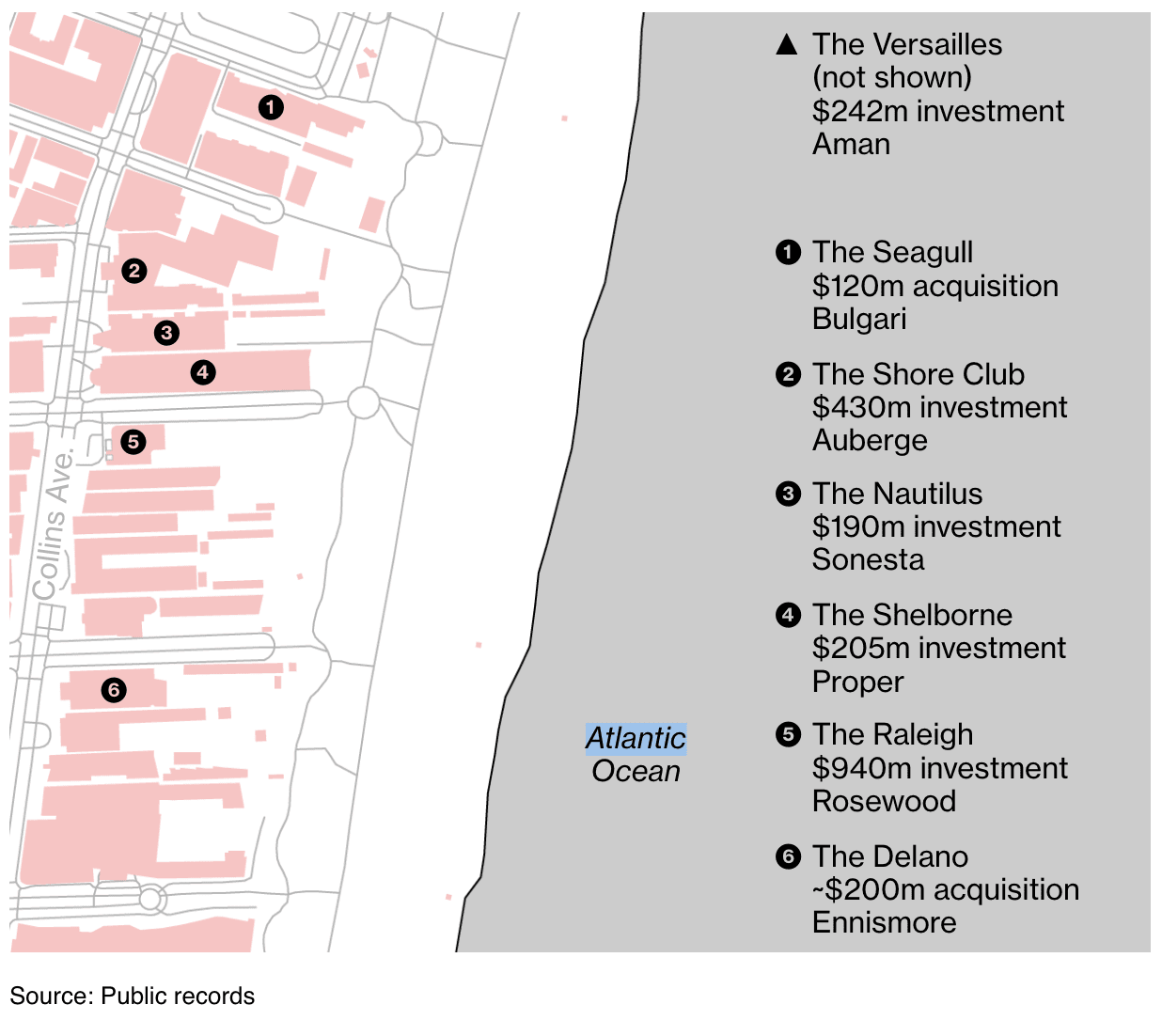Once completed in 2027, Miami’s “Billionaires’ Beach” is set to be a sun-drenched counterpart to Manhattan’s 57th Street or London’s Bishops Avenue.
The nickname was coined by Michael Shvo, a leading developer among those investing over $2.5 billion in just a few blocks along Collins Avenue, the iconic thoroughfare that lines Miami’s pristine coastline.
Some of the world’s most prestigious hotel brands are making their debut in South Beach, marking a grand revival of an area that once defined Miami’s luxury tourism.
Back in the late 1930s, this part of Miami hosted the city’s first beachfront hotels, characterized by white stucco facades designed by renowned architects of the time, including Lawrence Murray Dixon, Albert Anis, and Morris Lapidus.
The emerging skyline was once defined by the voluptuous curves and ziggurat-style rooflines of iconic landmarks like the Raleigh, the Miami-modern Shore Club, the porte-cochered Shelborne, and the crown-topped Delano. These buildings still stand today, although they bear the marks of time—faded by decades of ownership changes, weathered by the salt air, and reshaped by various renovations, some exquisite, others less so.

Miami's cultural and commercial influence has been rising steadily, placing it alongside London, Paris, and New York as a premier destination for luxury seekers, art enthusiasts, and business travelers. A significant trend contributing to this status is the integration of high-end hotels with multimillion-dollar residences, complemented by upscale dining, spas, and concierge services. This model offers a viable strategy to finance the thoughtful renovation of legacy buildings, especially amidst the current surge in Miami's real estate market.
A stroll along Collins Avenue, particularly between 14th and 20th streets—a stretch dubbed "Billionaires' Beach" by developer Michael Shvo—reveals the hospitality giants investing in the area. Rosewood Hotels is revitalizing the Raleigh; Auberge Resorts Collection is modernizing the Shore Club; California-based Proper Hotels is undertaking the Shelborne; and Bulgari is enhancing the Seagull. These developments signal a transformative era for Miami's luxury hospitality sector.
Miami developer Alex Witkoff attributes the city's remarkable transformation to the 2017 Tax Cuts and Jobs Act, which spurred an influx of affluent individuals and major corporations, including Citadel and Starwood Capital Group. "Miami became an international marketplace in a relatively short time," Witkoff observes, "leading to more sophisticated, more successful people coming and demanding the utmost quality."
The pandemic further ignited Miami's appeal, attracting a new wave of luxury travelers, acclaimed chefs, and tech entrepreneurs drawn to its relaxed lockdown policies and sunny atmosphere. This momentum didn’t wane post-pandemic; according to the Greater Miami Convention & Visitors Bureau, domestic tourism grew by 13% between 2021 and 2023. In 2024, CoStar data places Miami at the top of U.S. hotel markets, leading in both occupancy rates and revenue per available room.
Over $2 Billion in New Miami Hotel Developments
Developers are investing heavily along Collins Avenue, with over $2 billion poured into revitalizing this iconic stretch. Renowned brands are now making their mark on these legendary properties.
The visitor demographics in Miami have notably shifted from 2021 to 2023: the 45-plus age group increased by 10%, while the younger 18-to-34 crowd decreased by 13%. New Yorkers still make up a significant portion of visitors, joined by travelers from major markets like Atlanta, Los Angeles, Brazil, Colombia, and the UK.
A game-changer for "Billionaires’ Beach" was a 2019 zoning law that eased height restrictions on new developments between Collins Avenue and the ocean. Developer Michael Shvo, who advocated for the change before acquiring the Raleigh, called it pivotal. Restoring an 80-year-old property, he notes, wasn’t financially feasible without an additional revenue stream. To make an eight-figure renovation viable, more than 60 hotel rooms are needed, even at $1,000+ per night. But by adding a new tower featuring ultra-luxury condos priced in the tens or even hundreds of millions, the investment becomes far more attractive.

What the new Rosewood branded apartments at the Raleigh could look like.Renderings courtesy Rosewood Hotels
Shvo’s ambitious $1 billion transformation of the Raleigh, designed by architect Peter Marino and managed by Rosewood, will introduce a 17-story residential tower beside the historic hotel. This project will connect the Raleigh with two nearby Art Deco landmarks—the South Seas and the Richmond—creating a 3-acre complex. At its heart will be the iconic scrollworked pool, once a hub of Miami's social life. The top penthouse, spanning 13,000 square feet, is listed at $150 million, while three-bedroom units start at $10 million.
Just a block away at the Shore Club, Auberge Resorts is working with interior designer Bryan O'Sullivan—known for his work at London’s Claridge’s—on a complete reimagining of the hotel. Meanwhile, architect Robert A.M. Stern is constructing an 18-story residential tower next door. Despite the nearly century-long age gap between the buildings, Auberge’s chief creative officer, Kemper Hyers, emphasizes that both projects have been carefully designed to share a unified aesthetic. “Robert Stern has crafted a softer Art Deco style for the new tower, echoing details of the 73-room hotel, such as portholes and arches, but with a contemporary twist,” says Hyers. Residences are priced from $9 million.
A few blocks away in both directions, more iconic hotels are set for revitalization. The 1950s-era Nautilus, once famous for its grand central staircase designed to host full orchestras, is now enveloped by massive cranes. Sonesta International Hotels acquired the property in 2023 for $165 million, paving the way for its next chapter.

A rendering of bathroom suite at the reimagined Shore Club.Courtesy Shore Club
Proper Hotels is investing $205 million to revamp the Shelborne, known for its bold Kelly Wearstler designs in cities like Los Angeles and Austin, with plans to reopen next year. Meanwhile, the iconic Delano, which enjoyed a vibrant revival in the 1990s under Ian Schrager, was sold to Accor's Ennismore Hotels—the creators of Scotland’s famed Gleneagles resort—in a deal valued at approximately $200 million.
Perhaps the most eagerly awaited project is the $242 million transformation of the 1940s Versailles, situated just beyond the official borders of Billionaires’ Beach. Scheduled to reopen in 2026 as an Aman Resorts property, it will feature 56 hotel rooms and a 22-condo tower designed by Japanese architect Kengo Kuma.
Locals are debating whether this flurry of development signals a potential bubble. Critics warn that housing prices, a key indicator for the area, could be at risk. UBS Group AG’s 2023 Real Estate Bubble Index ranks Miami as the most overvalued market in the U.S. Adding to the concerns are rising sea levels and skyrocketing insurance rates, issues developer Michael Shvo did not address.
At the moment, there are hardly any signs of cooling in the market. For instance, Auberge’s $120 million penthouse is already under contract, despite being two years from completion. “Miami Beach is truly the American Riviera,” says Hyers. “This reinvention is set to become just as legendary.”




































































































